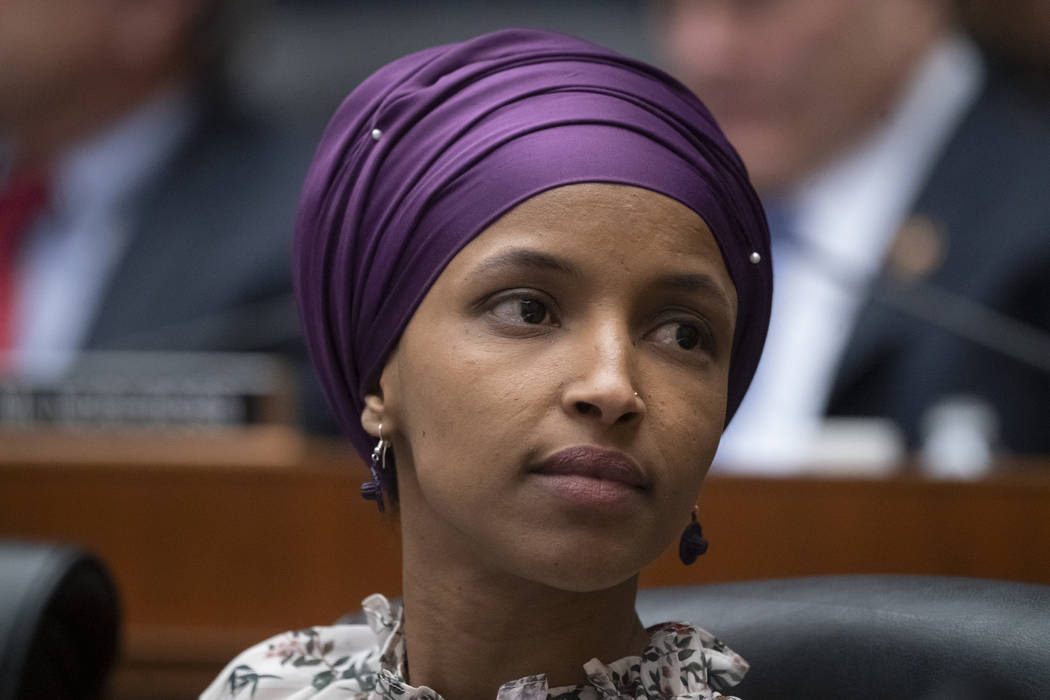Speech is not violence
Criticizing someone’s political views shouldn’t be conflated with threatening their life. Somehow, that’s now a debatable contention.
Last month, Rep. Ilhan Omar, D-Minn., referred to the 9/11 terror attacks as “some people did something.” Last week, Rep. Dan Crenshaw, R-Texas, tweeted in response, “First Member of Congress to ever describe terrorists who killed thousands of Americans on 9/11 as ‘some people did something.’ Unbelievable.”
Omar’s remarks soon went viral, and she received widespread criticism from conservative media. The front page of The New York Post last Thursday featured her quote and a photo of the Twin Towers burning. “Here’s your something: 2,977 dead by terrorism,” the headline read.
Omar could have defused this. Her passing reference to 9/11 was grotesque and inappropriately dismissive, but it was an aside in her speech. She could have apologized for sloppy wording and vowed to do better in the future. Instead, Omar and her allies sought to silence her critics by accusing them of stirring up threats against her.
“This is dangerous incitement, given the death threats I face,” Omar tweeted in reply to Crenshaw’s comment. “I hope leaders of both parties will join me in condemning it.”
“Stop targeting her this way. It’s absolutely putting her life in danger,” Rep. Rashida Tlaib, D-Mich., said.
Omar and Tlaib are asserting that political criticism is the moral, if not legal, equivalent of calling for violence. That’s a dangerous idea. Our system of government rests on open debate and discussion about policy and politicians. That’s why the First Amendment protects political speech.
Yet, leaders of the Democratic Party echoed Omar’s line of attack.
On Friday, President Donald Trump tweeted a video juxtaposing Omar’s words with footage from Sept. 11, 2001. Omar claimed the video triggered threats on her life. In response, House Speaker Nancy Pelosi demanded that Trump’s “dangerous video must be taken down.” Democratic presidential candidate Bernie Sanders also labeled the video “dangerous.”
“The president is inciting violence against a sitting congresswoman,” Democratic presidential candidate Elizabeth Warren tweeted.
Law enforcement officials should prosecute anyone physically threatening Omar. But it’s inappropriate to blame such behavior on Crenshaw and Trump.
Similarly, it would be inappropriate to blame Omar for threats on Trump’s life after she said he was not a “human.” Or to blame Sanders for one of his supporters shooting up a congressional baseball practice and almost killing Rep. Steve Scalise, R-La. Or to blame Democrats for a Minnesota teacher calling for someone to kill Justice Brett Kavanaugh.
If Democrats believed political criticism was incitement, they’d be calling for mass arrests within the mainstream media for their attacks on Trump. Instead, this is a case of selective outrage. They’re worried only about stopping speech that’s causing them political harm.
Speech isn’t violence. The press shouldn’t allow Democrats to conflate the two to protect Omar from well-deserved scrutiny.
Victor Joecks’ column appears in the Opinion section each Sunday, Wednesday and Friday. Contact him at vjoecks@reviewjournal.com or 702-383-4698. Follow @victorjoecks on Twitter.























